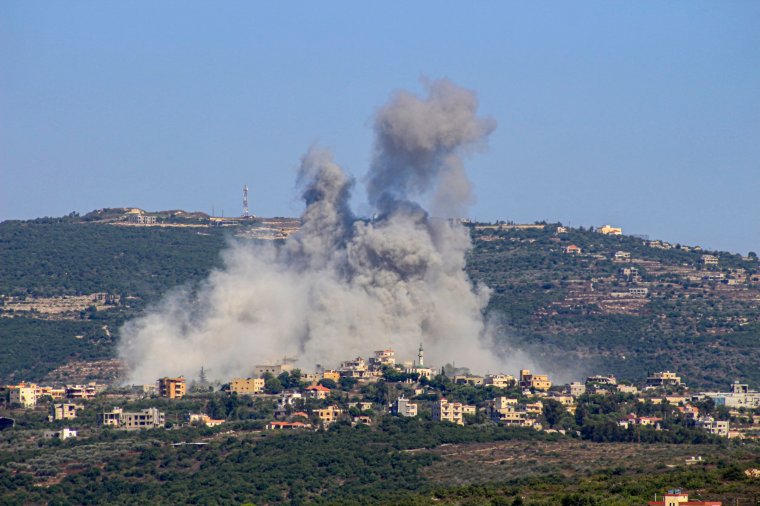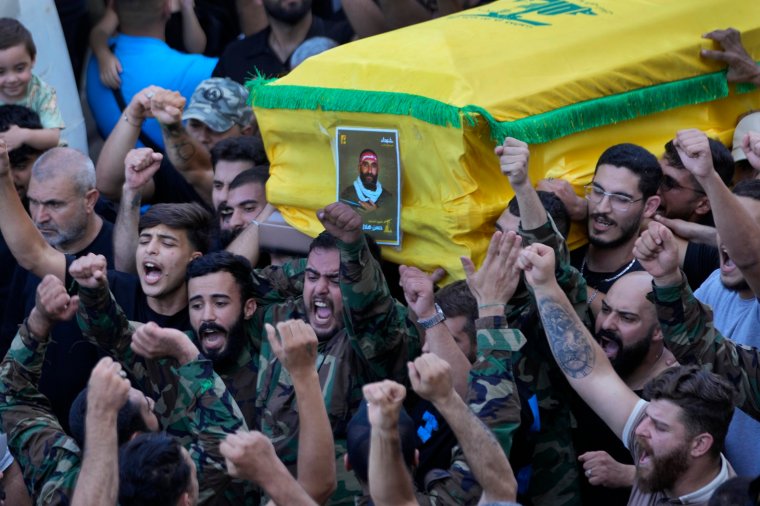World leaders are struggling to contain a new Middle East crisis with Israel and Hezbollah edging closer to the brink of war.
Israel’s security cabinet met in the afternoon after Prime Minister Benjamin Netanyahu’s return from the US to discuss plans to respond to the rocket strike, blamed on Hezbollah, that killed 12 children in the village of Majdel Shams in the occupied Golan Heights.
The Israeli leader had warned the Iran-aligned Lebanese militant faction would pay a “heavy price” for the attack, which it denies. Other coalition members called for war against Hezbollah and Lebanon.
The country’s defence Minister Yoav Gallant suggested a retaliation strike was likely, saying: “We will hit the enemy hard.”
Israeli MP Moshe Roth, who serves on the Foreign Affairs and Defence Committee, told i that the government was “leaning towards a powerful reaction” that could include “boots on the ground” in Lebanon.
Israel’s air force struck targets inside Lebanon yesterday but officials said this was not in response to the Majdel Shams incident, which marked the highest death toll in Israel-controlled territory in nine months of cross-border exchanges with Hezbollah.
The UK, EU, US, and Iran were all pressing the antagonists to pull back from the brink yesterday as managed hostilities threatened to explode into full-scale warfare.
Foreign Secretary David Lammy said: “The UK condemns the strike in Golan Heights that has tragically claimed at least 12 lives. We are deeply concerned about the risk of further escalation and destabilisation.”
US Secretary of State, Antony Blinken, said Washington did not want the conflict to escalate but added that Israel has the “right to defend its citizens.”

EU foreign policy chief, Josep Borrell, said “we urge all parties to exercise utmost restraint and avoid further escalation.”
Iran, which counts Hezbollah as the most powerful, valuable member of its “Axis of Resistance” coalition, which includes Hamas and the Houthis of Yemen, warned Israel that any “adventure” in Lebanon could lead to “unforeseen consequences.”
US officials warned Israeli counterparts last week that Iran would likely become involved in any war against Hezbollah.
But Israeli leaders appeared determined to respond fiercely to the deaths on Saturday.
Finance Minister, Bezalel Smotrich, tweeted: “For the deaths of little children, [Hezbollah leader Hassan] Nasrallah should pay with his head.” New Hope party MP Michel Buskila urged the government to “tear Beirut apart.”
Mr Roth, of the United Torah Judaism party, said no decision had been taken but the response was likely to be more powerful than anything seen yet on Israel’s northern front, and Israel and Hezbollah were closer to “all out war” than at any time during the conflict.
“A powerful action means destroying a lot of important strategic things in Lebanon. But it could also mean actually putting boots on the ground,” he told i, raising the prospect of a ground invasion into Lebanon for the first time since 2006, when a previous war between Israel and Hezbollah ended inconclusively.
Israeli troops could enter Lebanon to push enemy fighters back from the border to reduce the threat of rocket fire and allow an estimated 60,000 Israelis to return to homes they have evacuated due to fighting, the MP said. That option had previously been “postponed,” he added. “But the countdown has started.”

Diplomatic discussion has focused on the nature and scale of the Israeli response, with an acceptance that retaliation is inevitable.
Israeli newspaper Haaretz reported that one Israeli plan under consideration is for a few “intense days of combat” that could allow subsequent de-escalation. Lebanese television channel LBCI reported that efforts are under way to spare Beirut and other heavily populated locations, citing US and Lebanese officials.
Lebanon’s Middle East Airlines suspended flights yesterday without providing an explanation.
Professor Kobi Michael, a military analyst at Israel’s Institute for National Security Studies and the Misgav Institute, said the military could manage escalation by striking Hezbollah rather than Lebanese targets.
“I assume that Israel still prefers not to expand the war and to turn into all out war with Hezbollah, at least under the current circumstances when we are still busy in Gaza, and we haven’t built yet the agreement with the US,” he said. “An all out war might be very risky as it could turn into a broader regional war with an active involvement of the Iranians. And here, Israel needs the US – mainly with regard to ammunition.”
“I believe that Israel will try to find a way to retaliate aggressively with very harsh retaliation, but it will be focused on military targets of Hezbollah” to “maintain the equation set since 8 October,” Dr Michael added.
“But I’m sure that the Israeli decision makers – the political echelon and the military echelon – are preparing for all out war, because you know where you begin but you never know how it will end. And I think that we are on a very, very slippery slope.”
But Michael Young, senior editor at the Carnegie Middle East Center based in Beirut, expressed confidence a war could still be avoided.
“Both Israel and Hezbollah have been careful not to escalate into an all out war for a variety of reasons, and I don’t think the Israelis are going to use this as the excuse,” he told i. “Partly because they are not that ready for a major war at this point. They have used up a lot of equipment and realise that the outcome of a war in Lebanon would be very uncertain.”

